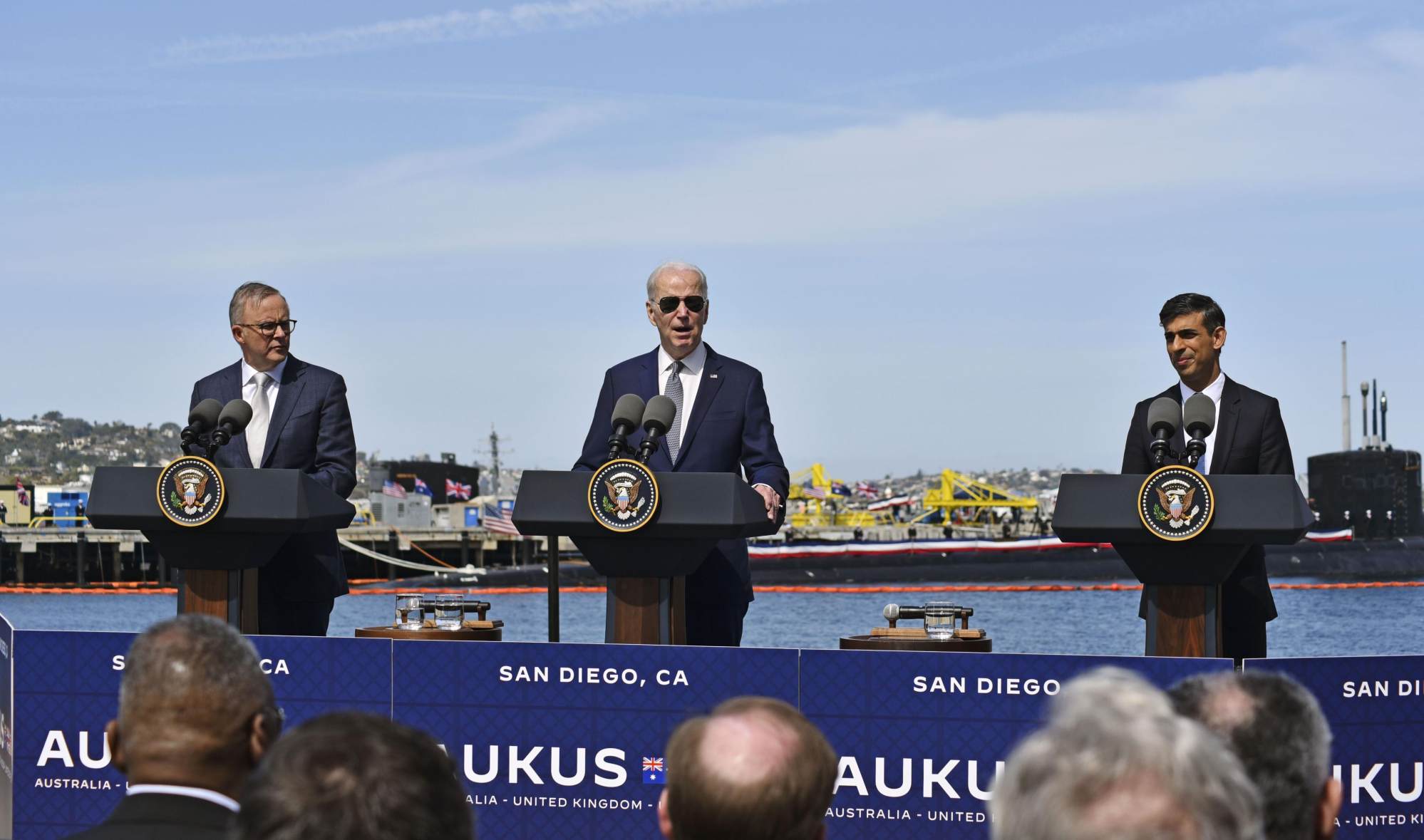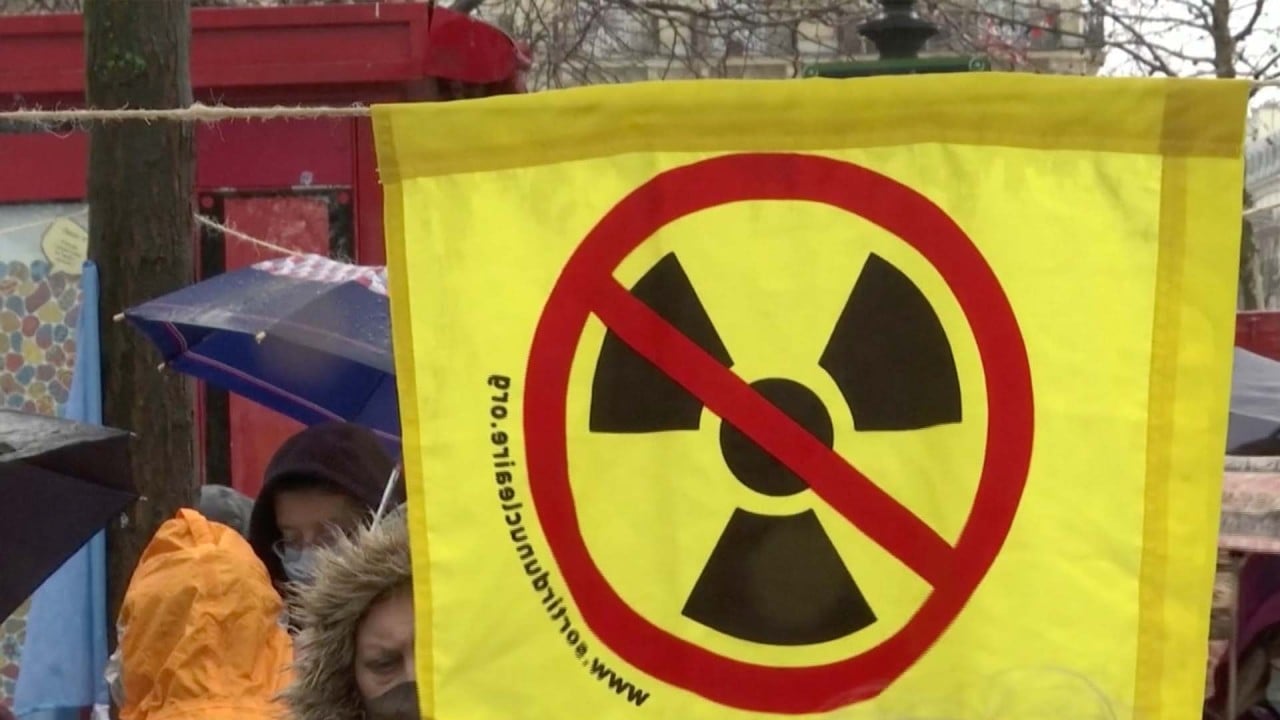
Aukus deal: Australia has ‘a lot to do’ in Southeast Asia to calm concerns over submarines, analysts say
- Canberra has its work cut out explaining purchase of US submarines to governments like Indonesia and Malaysia, who worry about provoking China, say experts
- Region is ‘increasingly divided over US-China; all Asean member states need economic ties with China but rely on US for stability and security’
The submarines – nuclear-powered but not nuclear-armed – will allow patrols closer to the Asian mainland without a port call.
Aukus: Australia’s best way to counter China, or an expensive mistake?
Two nuclear-weapon states – the US and UK – claiming to uphold nuclear non-proliferation standards while transferring weapons-grade enriched uranium to a non-nuclear-weapon state was “a textbook case of double standard” that would damage the international non-proliferation system, the mission said.
Joshua Bernard Espeña, resident fellow at the Manila-based International Development and Security Cooperation said the Association of Southeast Asian Nations (Asean) has “cautiously welcomed Aukus as a developing reality” in light of US-China rivalry, adding that he believes the deal will increase regional security and stability.

And he said the Philippines views the alliance positively, amid President Ferdinand Marcos Jnr’s efforts to work closely with the US and Japan, potentially via a three-way partnership.
“Aukus could serve as a blueprint for developing a new Quad to augment regional security architecture,” Espeña added.
Quad – the Quadrilateral Security Dialogue – consists of the US, Japan, Australia and India. The grouping, initially conceptualised in 2007, became dormant following waning interest from the four countries but has been revived in recent years amid rising Chinese assertiveness.
Espeña said that the new submarines mean Australia will be able to better monitor communications under the water, while the vessels can also remain beneath the waves longer than the nation’s current diesel-electric submarines.
But, he said, “the caveat” is that “Australian diplomacy has a lot of work to do” to explain the new situation to Southeast Asian governments “like Indonesia and Malaysia, worried about the risks involved in provoking China”.
These nations would do well, he said, “to ask Australia to clarify how it would use Aukus strategically in a way that would enhance [rather] than erode the rules-based order”.
He said a good move at Asean defence events would be to push the agenda of submarine safety protocol during distress and encounters.
On Tuesday, US assistant secretary of state for East Asian and Pacific Affairs Daniel Kritenbrink said Washington has had regular consultations and dialogues on Aukus with various partners, including in Southeast Asia.
Pointing to his visit to Jakarta and Kuala Lumpur last week, Kritenbrink said he had explained clearly “what Aukus is and what Aukus is not”.
Australia seeks Aukus submarine deal to ‘better ensure strategic equilibrium’
“Aukus is about promoting peace, stability, security and prosperity across the Indo-Pacific region, it's a modernisation of our existing alliances and partnerships,” he added.
“This is a responsible and transparent agreement that is carried out in the name of the highest standards of non proliferation.”
Australia’s Foreign Minister Penny Wong, meanwhile, said Canberra planned to “talk with the region and listen to the region about any concerns they may have”.
Speaking to Singapore’s national news agency CNA, Wong said Australia “will never seek to acquire nuclear weapons”.
Aukus nuclear submarine plan unveiled by US, UK, Australia leaders
Australia’s chief of navy Mark Hammond is expected to begin a Southeast Asian tour later this week as part of a diplomatic offensive, the Australian Financial Review reported on Tuesday.
Southeast Asian countries have previously expressed concerns that Australia’s nuclear-propelled submarines may mainly operate in their region, particularly in the South China Sea.
The likes of Malaysia and Indonesia have also been anxious over the risk of nuclear proliferation, with Jakarta noting that sharing nuclear technology to power submarines could heighten the risk of new weapons of mass destruction. Vietnam and Thailand also share these concerns.
The Aukus pact is seen as exploiting a loophole in the 1968 Nuclear Non-Proliferation Treaty (NPT) to allow for the transfer of fissile material and nuclear technology from a nuclear weapons state to a non-weapons state.
Aukus pact, rare earth production will keep Australia self-reliant: Albanese
The loophole allows fissile material utilised for non-explosive military use, like naval propulsion, to be exempt from International Atomic Energy Agency inspections and monitoring.
This makes arms control experts nervous as it sets a precedent that could be used by others to hide highly enriched uranium, or plutonium, the core of a nuclear weapon, from international oversight.
Thitinan Pongsudhirak, international relations professor at Thailand’s Chulalongkorn University said the Aukus deal, giving more muscle to Australia’s naval capabilities, is not seen as helpful as “there are enough measures out there” in dealing with China.
Pongsudhirak added that Australia’s recent reset with China – highlighted by Albanese’s meeting with President Xi Jinping in November after a three-year diplomatic freeze – is broadly welcomed in Southeast Asia as the region’s chief concern is to push back against Beijing’s “belligerence without outright antagonism”.

Asean is “increasingly divided” over the differences between the US and China, as “all member states need economic ties with China but rely on the US for stability and security”, Pongsudhirak said.
Australia appears intent on shoring up its relations with China, he noted, and reinforcing its cooperation with the US at the same time; the Albanese-Xi Jinping meeting moved Canberra to a “less adversarial and confrontational” position than the previous Scott Morrison government.
“But the Albanese government also doubled down on the US alliance, with renewed vigour on Quad and Aukus, this is a case of trying to have the cake and eating it too,” Pongsudhirak added.
Rory Medcalf, head of Australia National University’s National Security College, said on Twitter that the region should be braced for a wave of Chinese efforts “to stir up Southeast Asia”.
“Remember that China’s nuclear-powered – and in some cases nuclear-armed – submarine fleet is already active across Southeast Asian waters,” he wrote.


